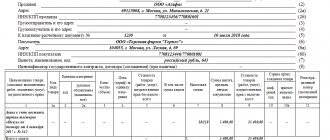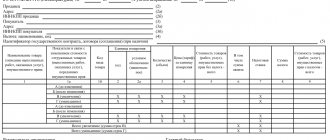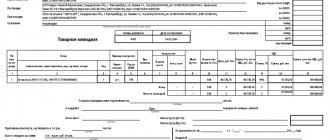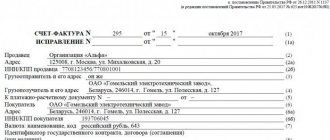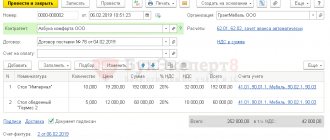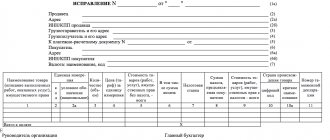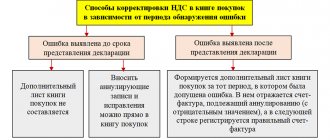The legislative framework
Article 169 of the Tax Code of the Russian Federation
An invoice is a document on the basis of which the buyer can accept the provided property rights, goods or services, the amount of tax contributions in the prescribed manner. Such a document can be prepared in paper or electronic form.
Invoices can be drawn up in digital form if there is mutual agreement between the parties to the transaction, as well as the possibility of using appropriate technical devices to familiarize themselves with the content of the completed documentation.
In essence, an invoice is a type of accounting documentation that confirms the fact that certain goods have been shipped, or specific services have been provided, taking into account their cost. Such certificates are needed to certify the amount of VAT on the sale of products or certain services and to confirm the purchase, as well as input VAT.
The content of the invoice consists of books in which transactions are recorded and VAT is taken into account in the territorial offices of the tax service. An invoice is provided to the buyer when he receives goods or certain services from the seller.
There are two main types of invoices:
- The standard is set by the seller when goods are shipped or services are provided after the agreed amount of means of payment has been paid in full.
- An advance invoice is issued upon making an advance payment. Information about the senders and recipients of the cargo is never indicated in such documents. However, such a certificate must always contain information regarding settlement and payment documentation.
- The basic rules for issuing an invoice are specified in Art. 169 of the Tax Code of the Russian Federation.
Some nuances of issuing invoices and the legal relationship to them
The buyer is obliged to accept for deduction the amounts of tax presented by the seller, even if the requirements of paragraphs 5 and 6 of the article in question are not met.
In addition to the main ones, the invoice may also contain additional details, for example, the position of the authorized person who signed the invoice on the basis of some documents. The presence of such details cannot be a basis for refusing to deduct VAT amounts charged to the buyer by the seller.
If goods are purchased by an organization through its separate divisions, then invoices for goods shipped are issued in the name of the organization, since separate divisions cannot be VAT payers.
Why do you need to prepare such documents?
Invoice: sample
VAT is considered a very significant component of regular accounting reporting for every enterprise operating and providing tax contributions according to a standardized system. To use the right to deduct a specific tax, each agent will have to issue an invoice in accordance with the rules established by law.
Such documents are considered as basic for the application of the right of deduction, despite the fact that in fact they do not constitute evidence of acceptance and transfer of goods or provision of the service specified in the document. For this purpose, a TTN is specially drawn up, as well as a document indicating the acceptance or transfer of goods, documents or the provision of certain services.
Article 169 of the Tax Code of the Russian Federation states that an invoice can be defined as the main accounting document, since it contains a complete list of indicators necessary for this, about and the Tax Code of the Russian Federation.
In specially compiled journals, it is necessary to keep track of the existing list of invoices. When preparing tax reports, the combined VAT figures indicated in such journals are taken into account. Based on such reports, the total amount of tax contributions that must be paid to the state budget is determined.
Starting from 2021, all commercial organizations and enterprises interacting with invoices are required to comply with the established standards for filling out, and also use the form defined by the RF PP dated December 26, 2011 No. 1137 with adjustments from 2014.
Preparation of invoices and disputes with tax authorities
Taxpayers and tax authorities regularly argue over the correctness of filling out invoices. The relevant question is whether the taxpayer has the right to tax deductions if the buyer’s TIN is incorrectly indicated on the invoice. Typically, courts on this issue believe that incorrect indication of the buyer’s TIN cannot be considered a significant violation; it cannot serve as a reason for refusing to apply tax deductions.
For example, if the contractor incorrectly indicated the customer’s TIN in the invoice, which is known to the tax authority, and other details of the invoices are filled out correctly, which makes it possible to identify the customer, and his TIN is correctly indicated in the contract, acceptance certificates of work performed, then technical the error cannot be considered as preventing tax control.
However, it must be borne in mind that a unified position of the courts on this issue is impossible. First of all, due to the fact that the same violation in different subjects can be associated with different circumstances.
According to the Federal Antimonopoly Service of the Central District, the tax authority’s arguments about the unreliability of the taxpayer’s TIN indicated in the invoices are incorrect, since the TIN only contained an extra zero. Such misrepresentation does not prevent the actual identification of the seller. You can verify this by reading the Resolution No. A14-7612/2011 dated 04/08/2013.
The Federal Antimonopoly Service of the North-Western District also rejected the tax authority’s argument that an invalid TIN invalidates the invoice. The taxpayer requested a real TIN from the counterparty, which he used in further documentation, and the tax authority was unable to prove that the taxpayer knew or could have known that the seller provided false or contradictory information necessary for tax control, but the tax authority did not provide it. This is evidenced by Resolution No. A42-2345/2010 dated July 23, 2012.
However, there are also counter examples. The indication by sellers in invoices of TINs, which, according to tax authorities, were assigned to other taxpayers or are fictitious, indicates that these documents do not comply with the requirements of paragraph 5 of Art. 169 of the Tax Code of the Russian Federation and entails negative legal consequences for the taxpayer. This conclusion can be drawn from the Resolution of the Federal Antimonopoly Service of the Central District dated 04/05/2012 No. A68-2733/11, the Determination of the Supreme Arbitration Court of the Russian Federation dated 08/06/2012 No. VAS-10258/12.
Of no small importance here is what the error was in its essence - a deliberate distortion of facts or a consequence of a random combination of circumstances.
Distinctive features of an invoice
Invoice journal
Some businessmen do not understand the difference between invoices and ordinary delivery notes. The difference between such a document and a regular invoice is that the invoice must be provided exclusively to sellers or official suppliers of certain services who pay VAT.
Each representative of his organization must understand that an invoice is considered a mandatory type of accounting documentation, drawn up by a staff accountant on the basis of a purchase and sale agreement or for the provision of certain services.
Each supplier needs an invoice to be able to draw up reports in obtaining the right to a tax deduction approved by law; the invoice is provided to the customer himself to pay for the agreed services and material assets provided.
Also, Article 169 of the Tax Code of the Russian Federation states that the issuance of an invoice and delivery note is carried out upon the conclusion of one agreement. However, form, function and content have certain differences. The invoice must be drawn up only in accordance with the specified sample, while the invoice is drawn up in any form.
An invoice must be issued after the means of payment have been provided as payment for the product or service. This document is considered confirmation for the possibility of deducting VAT. The invoice must be filled out after shipment of a certain group of goods to be able to document the action performed.
Based on the received invoice, the customer will be able to make specific claims to the service provider in case of disagreement.
Tax Code of the Russian Federation (Chapter 21 Value Added Tax)
◄ Previous| 143 145 145.1 146 147 148 149 150 151 153 154 155 156 157 158 159 160 161 162 162.1 163 164 165 166 167 168 169 170 171 172 173 174 174.1 176 176.1 177 | Next ► |
1. Invoice
is a document that serves as the basis for the buyer to accept the goods (work, services), property rights presented by the seller (including the commission agent, agent who sells goods (work, services), property rights on their own behalf) amounts of tax (VAT) for deduction in the manner provided for by this chapter. (as amended by the Federal Law of July 22, 2005 N 119-FZ)
An invoice can be compiled and issued on paper and (or) electronically. Invoices are prepared electronically by mutual agreement of the parties to the transaction and if said parties have compatible technical means and capabilities to receive and process these invoices in accordance with established formats and “order.” (paragraph introduced by Federal “law” dated July 27, 2010 N 229-FZ)
2. Invoices are the basis for accepting tax amounts presented to the buyer by the seller for deduction when the requirements established by “clauses 5”, “5.1” and “6” of this article are met.
Errors in invoices that do not prevent tax authorities from identifying the seller, buyer of goods (work, services), property rights, the name of goods (work, services), property rights, their value, as well as the tax rate and tax amount when conducting a tax audit, presented to the buyer are not grounds for refusal to accept tax amounts for deduction.
Failure to comply with invoice requirements not provided for in paragraphs 5 and 6 of this article cannot be grounds for refusal to deduct tax amounts presented by the seller. (Clause 2 as amended by the Federal Law of December 17, 2009 “N 318-FZ”)
3. The taxpayer is obliged to draw up an invoice, keep “log books of received and issued invoices”, “purchase books” and “sales books”, unless otherwise provided by “paragraph 4” of this article:
1) when performing transactions recognized as an object of taxation in accordance with this chapter, including those not subject to taxation (exempt from taxation) in accordance with “Article 149” of this Code;
2) in other cases determined in accordance with the established procedure.
4. Invoices are not drawn up by taxpayers for transactions involving the sale of securities (except for brokerage and intermediary services), as well as by banks, a development bank - a state corporation, insurance organizations and non-state pension funds for transactions that are not subject to taxation (exempt from taxation) in in accordance with “Article 149” of this Code. (as amended by Federal Laws dated December 29, 2000 “N 166-FZ”, dated July 19, 2011 “N 245-FZ”)
5. The invoice issued for the sale of goods (work, services), transfer of property rights must indicate: (as amended by Federal Law No. 224-FZ of November 26, 2008)
1) serial number and date of the invoice; (as amended by the Federal “law” dated July 27, 2010 N 229-FZ)
2) name, address and identification numbers of the taxpayer and buyer;
3) name and address of the shipper and consignee;
4) the number of the payment and settlement document in case of receiving advance or other payments for upcoming deliveries of goods (performance of work, provision of services);
5) name of the goods supplied (shipped) (description of work performed, services provided) and unit of measurement (if it is possible to indicate it); (as amended by the Federal Law of May 29, 2002 N 57-FZ)
6) quantity (volume) of goods (work, services) supplied (shipped) according to the invoice, based on the units of measurement adopted for it (if it is possible to indicate them); (as amended by the Federal Law of May 29, 2002 N 57-FZ)
Until the Government of the Russian Federation approves the invoice form, which provides for the indicator “name of currency” and the procedure for filling out this indicator, it is not required to indicate the name of the currency in invoices (“letter” of the Ministry of Finance of the Russian Federation dated October 12, 2010 N 03-07-09/46)
6.1) name of the currency; (Clause 6.1 introduced by Federal “law” dated July 27, 2010 N 229-FZ)
7) price (tariff) per unit of measurement (if it is possible to indicate it) under the agreement (contract) excluding tax, and in the case of using state regulated prices (tariffs) that include tax, taking into account the amount of tax; (as amended by the Federal Law of May 29, 2002 N 57-FZ)
 the cost of goods (work, services), property rights for the entire quantity of goods supplied (shipped) according to the invoice (work performed, services rendered), transferred property rights without tax; (as amended by the Federal Law of July 22, 2005 N 119-FZ)
the cost of goods (work, services), property rights for the entire quantity of goods supplied (shipped) according to the invoice (work performed, services rendered), transferred property rights without tax; (as amended by the Federal Law of July 22, 2005 N 119-FZ)
9) the amount of excise tax on excisable goods;
10) tax rate;
11) the amount of tax imposed on the buyer of goods (works, services), property rights, determined based on the applicable tax rates; (as amended by the Federal Law of July 22, 2005 N 119-FZ)
12) the cost of the total quantity of goods supplied (shipped) according to the invoice (work performed, services rendered), transferred property rights, taking into account the amount of tax; (as amended by the Federal Law of July 22, 2005 N 119-FZ)
13) country of origin of the goods;
14) number of the customs declaration. (as amended by the Federal Law of July 22, 2005 N 119-FZ)
The information provided for in “subparagraphs 13” and “14” of this paragraph is indicated in relation to goods whose country of origin is not the Russian Federation. The taxpayer selling the specified goods is responsible only for the compliance of the specified information in the invoices presented to him with the information contained in the invoices and shipping documents received by him. (as amended by the Federal Law of December 29, 2000 N 166-FZ)
5.1. The invoice issued upon receipt of payment, partial payment for upcoming deliveries of goods (performance of work, provision of services), transfer of property rights, must indicate:
1) serial number and date of the invoice; (as amended by the Federal “law” dated July 27, 2010 N 229-FZ)
2) name, address and identification numbers of the taxpayer and buyer;
3) number of the payment and settlement document;
4) name of the goods supplied (description of work, services), property rights;
Until the Government of the Russian Federation approves the invoice form, which provides for the indicator “name of currency” and the procedure for filling out this indicator, it is not required to indicate the name of the currency in invoices (“letter” of the Ministry of Finance of the Russian Federation dated October 12, 2010 N 03-07-09/46)
4.1) name of the currency; (Clause 4.1 introduced by Federal Law No. 229-FZ dated July 27, 2010)
5) the amount of payment, partial payment for upcoming deliveries of goods (performance of work, provision of services), transfer of property rights;
6) tax rate;
7) the amount of tax imposed on the buyer of goods (works, services), property rights, determined based on the applicable tax rates. (Clause 7 introduced by Federal “law” dated November 26, 2008 N 224-FZ)
6. The invoice is signed by the head and chief accountant of the organization or other persons authorized to do so by an order (other administrative document) for the organization or a power of attorney on behalf of the organization. When issuing an invoice by an individual entrepreneur, the invoice is signed by the individual entrepreneur indicating the details of the certificate of state registration of this individual entrepreneur. (as amended by the Federal Law of May 29, 2002 N 57-FZ)
An invoice drawn up in electronic form is signed with an electronic digital signature of the head of the organization or other persons authorized to do so by an order (other administrative document) for the organization or a power of attorney on behalf of the organization, individual entrepreneur in accordance with the “legislation” of the Russian Federation. (paragraph introduced by Federal “law” dated July 27, 2010 N 229-FZ)
7. If, under the terms of the transaction, the obligation is expressed in foreign currency, then the amounts indicated in the invoice may be expressed in foreign currency. (as amended by the Federal Law of December 29, 2000 N 166-FZ)
Until the Government of the Russian Federation approves the documents provided for in paragraph 8 of Article 169 (as amended by Federal Law No. 229-FZ of July 27, 2010), the preparation and issuance of invoices, the maintenance of a log of received and issued invoices, purchase books and sales books are carried out with taking into account the requirements established before the entry into force of the Federal Law of July 27, 2010 N 229-FZ (“Clause 4 of Article 10” of the Federal Law of July 27, 2010 N 229-FZ).
8. The form of the invoice and the procedure for filling it out, the forms and procedure for maintaining a log of received and issued invoices, purchase books and sales books are established by the Government of the Russian Federation. (clause 8 as amended by the Federal “law” dated July 27, 2010 N 229-FZ)
9. The “procedure” for issuing and receiving invoices in electronic form via telecommunication channels using an electronic digital signature is established by the Ministry of Finance of the Russian Federation. The formats of the invoice, journal of received and issued invoices, purchase books and sales books in electronic form are approved by the federal executive body authorized for control and supervision in the field of taxes and fees. (Clause 9 was introduced by Federal Law No. 229-FZ of July 27, 2010).
| ◄ Previous | 143 145 145.1 146 147 148 149 150 151 153 154 155 156 157 158 159 160 161 162 162.1 163 164 165 166 167 168 169 170 171 172 173 174 174.1 176 176.1 177 | Next ► |
When is the document used?
An invoice is a document that serves as the basis for the tax authority to accept the buyer for deduction of VAT presented by the seller. When selling goods, providing services, performing work or transferring property rights, sellers charge VAT by issuing an invoice (what is an invoice for?).
Invoices are registered in the Journal of issued and received invoices (books of purchases and sales), and the displayed VAT amounts are subsequently taken into account in tax returns, and at the end of the reporting period, based on the entries made, the amount of tax payable to the budget is calculated.
Selling products by agent
The agent may, on his own behalf, sell the principal's products subject to the latter's instructions. In this case, you need to do the following:
- Filling out two SFs.
- One paper is sent to the acquirer.
- The second paper is registered in the SF accounting journal.
- There is no need to register the document in the sales ledger.
- The SF values are sent to the principal.
The principal, when receiving values from the agent, performs these actions:
- Issuance in the name of the SF agent.
- Registering an account in the sales ledger.
All this information must be recorded in part 2 of the Federation Council journal.
When is a document written with dashes?
A dash in the appropriate place on the invoice is used if there is no data to indicate the indicator (Resolution No. 1137). For example, the presence of dashes is justified when drawing up documents:
- For advances, services, sale of rights, for which the consignor and consignee are not indicated and there may be no information about the unit of measurement and the associated quantity and price (letter of the Federal Tax Service of Russia for Moscow dated March 15, 2012 No. 16-15/22629).
- For objects of sale created (processed) in the Russian Federation, or those for which it is impossible to indicate the country of their origin (letters of the Ministry of Finance of Russia dated August 15, 2013 No. 03-07-08/33247, dated December 26, 2014 No. 03-07-08/67893 ).
- For goods from the Customs Union, when imported from which a customs declaration is not issued and therefore information about the place of origin is not required (letters of the Ministry of Finance of Russia dated September 12, 2012 No. 03-07-14/88, dated July 25, 2012 No. 03-07- 13/01-43).
- For goods from the European Union, for which there is no special code, and then if there is a name of the union as a country, a dash will be present in the column of its code (letter of the Ministry of Finance of Russia dated July 19, 2012 No. 03-07-09/68, Federal Tax Service of Russia dated September 4 .2012 No. ED-4-3/ [email protected] ).
